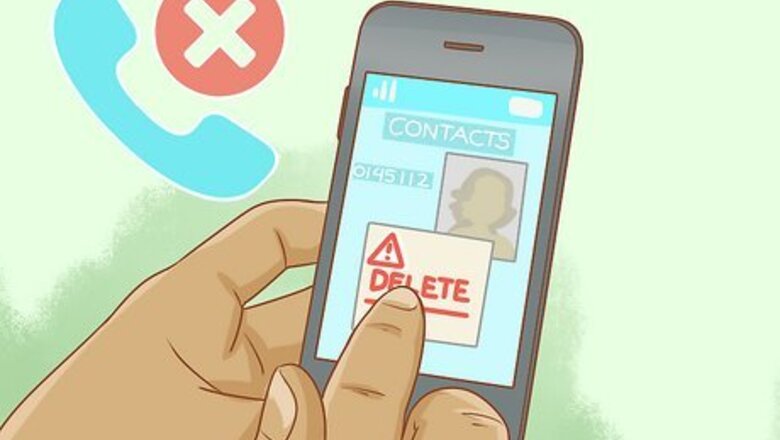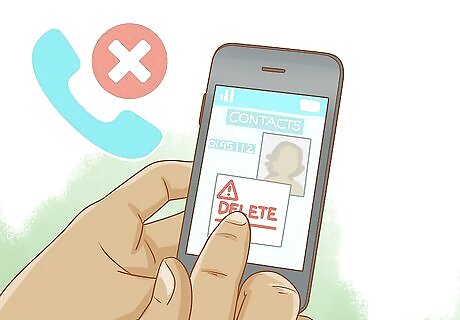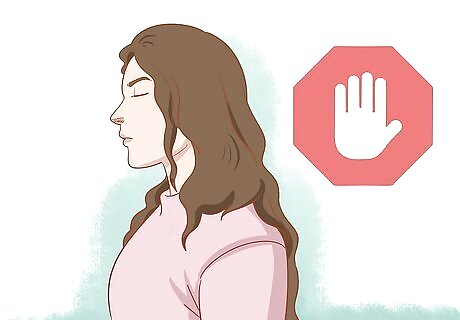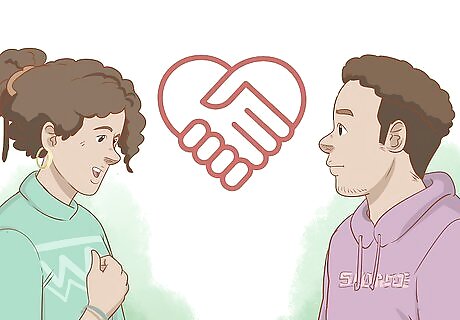
views
X
Trustworthy Source
Mayo Clinic
Educational website from one of the world's leading hospitals
Go to source
But if you’re trying to get over any type of challenging or dysfunctional relationship, these steps will help you move on for good.
Go no contact.

If the relationship was abusive, it may be best to stop all communication with them. Going no contact means blocking your ex from all ways of contacting you. That means social media, texting, calling, and seeing them in person. Avoiding them will help you heal from the relationship without them manipulating you. The no-contact rule typically lasts 30 days, but it may be best to stick to the no-contact rule indefinitely when moving on from a particularly unhealthy relationship. Someone who struggles to feel empathy and reciprocate feelings may turn to manipulation to form the relationship they want. Not communicating with your ex will break this manipulative cycle and help you connect with your feelings as an individual.
Set boundaries for yourself.

Heal by creating distance between you and your ex. Boundaries will not only help you protect yourself from their selfish behavior, but they will encourage you to grow. You are worthy of respect and deserve kindness, so set boundaries that’ll help you bloom. Stick to the no-contact rule and avoid answering their calls, or try your best not to talk about them. Build boundaries to protect yourself from further abuse rather than building them to keep people out. For example, keep some personal information like your fears to yourself when meeting new people, but don’t be afraid to express your interests. Vocalize your boundaries by telling your ex, “You can’t treat me this way,” or, “I don’t have to listen to your abuse.” Prioritize self-care when establishing your boundaries by focusing on your needs first.
Reflect on the relationship.

Move on by making peace with the past. You’re most likely angry with your ex and how they manipulated you. It’s normal—healthy even—to feel hatred toward the relationship, but your anger won’t help you move forward. Take time to reflect on the ups and downs of the relationship, focusing on what you learned. The goal is to eventually make peace with what happened. Anger can help you see the wrongs in the relationship, but it won’t help you heal emotionally. Forgiveness doesn’t mean you have to let your ex off the hook. They hurt you, and you don’t need to forget it. What you do need is to forgive yourself.
Write down your reasons for moving on.

Remove self-doubt by reminding yourself why the relationship’s over. Make a list of all the reasons why you want to keep moving forward without your ex. Being clear on why you want to move on can help motivate you when things get tough. Your reasons can be specific to the relationship or about personal growth. For example, you can write, “I want to move on because they made me feel bad about my cooking,” or, “I want to move on because I deserve love and respect.” Save the list on your phone or keep it in your favorite notebook. Refer back to the list when you start having self-doubts or your ex tries to contact you.
Take a break from dating.

A toxic relationship can make you second guess your ability to have healthy relationships. When you’re in a relationship with someone who’s self-centered or thoughtless, you may feel like an accessory or unimportant. It’s important to reconnect with your self-worth before jumping back into the playing field because you can’t have a healthy romantic relationship without a healthy relationship with yourself. Try not to rush the need to start dating again. Protect yourself by making sure you’re ready to be in a new relationship. Being ready to date again will look different for everyone. Perhaps your ex isn’t on your mind anymore, you feel confident, or you meet someone special. Remember, recovery isn’t linear. Go at your own pace and do what you think is right.
Let yourself grieve.

Breakups can be hard even when they end a toxic relationship. You may feel lost, confused, angry, and frustrated when leaving someone with narcissistic traits, and it’s okay to grieve what you’ve lost. Be kind to yourself; healing takes time. All of your feelings are valid, so let them come and go. Think of each emotion as a new wave in the healing process. Waves crash and fall, but they eventually leave with the tide. Your ex may not share your grief. They might miss the praise and admiration, but they’ll find it easy to move on. Don’t take this personally, as this is not a reflection of your worth but a reflection of their egotistical behavior.
Know that it’s okay to still have feelings.

No matter how badly your ex treated you, you may still love them, and that’s okay. It’s normal to feel lonely and confused after a breakup, and it’s even more common to feel lost after breaking up with someone who manipulated or gaslit you. You may still want them back just to fill the emptiness in your heart, but know that this is part of the healing process. Every feeling you’re feeling is valid, even if it contradicts what you think you should be feeling. Acknowledge your emotions, feel them, and let them go. Try filling that emptiness with something else, like a craft, a new pet, or time with friends.
Reconnect with yourself.

Do things you love to help you move on. Focus on your dreams and your future because your ex isn’t around to control you anymore. Is there a hobby your ex made you give up? Did you give up your dream of getting a master's because they thought it was best? Rekindling these joys can help you find yourself again. Chase the dreams your ex made you forget. Explore the hobbies your ex thought were silly. Do whatever makes you happy!
Love yourself a little more.

The key to moving on is falling back in love with yourself. You deserve to be in a loving relationship, so why not make that first comeback loving yourself? Unravel the critiques and negative thoughts your ex may have instilled in you. Treat yourself to something special, like a new outfit, your favorite dessert, or a day at the spa. Take the time to care for yourself in a way they never did. Self-forgiveness is an important part of loving yourself. Forgive yourself for all your self-doubts, and push aside lingering negative thoughts.
Remember who you are.

You’re so much more than a person who was in a relationship. Your ex may make you think you’re nothing without them, but they’re wrong. Make a list of all of your hobbies, strengths, and relationships. What are you to your family and friends? What are things you love to do? What are you to yourself? Reminding yourself of these things can help you reconnect with your identity. Think about how you describe yourself to others. Are you a painter? A student? Ask yourself what you mean to people you care about. Are you a sibling? A best friend? Consider how you view yourself by asking yourself, “Who am I?” and, “What do I like?”
Reach out to loved ones for support.

Moving on isn’t something you have to do alone. Your ex may have hurt some of your relationships with friends and family members, and now is the time to reach out. Ask for some guidance, or simply ask for a hug. No matter what your ex may have told you, you’re not alone. Apologize to those your ex may have hurt. Taking the time to talk to your friends and family members about the abuse can help mend your relationship with them. It can be difficult to trust after being in a relationship with someone who behaved in a narcissistic way. Fear might make you want to push loved ones away, but know not everyone is going to hurt you.
Seek professional help.

Therapists and counselors are here to help you through this difficult time. They can guide you on your path of healing and help you work through any negative thoughts or behaviors. Being in a relationship where your needs aren’t prioritized can put a toll on your mental well-being, and you don’t need to go through the process of moving on alone. If you’re a victim of domestic violence abuse, contact the National Domestic Violence Hotline at 1(800)799-7233. If you need help on your healing journey, contact The Center For Hope at (716)955-9658.




















Comments
0 comment